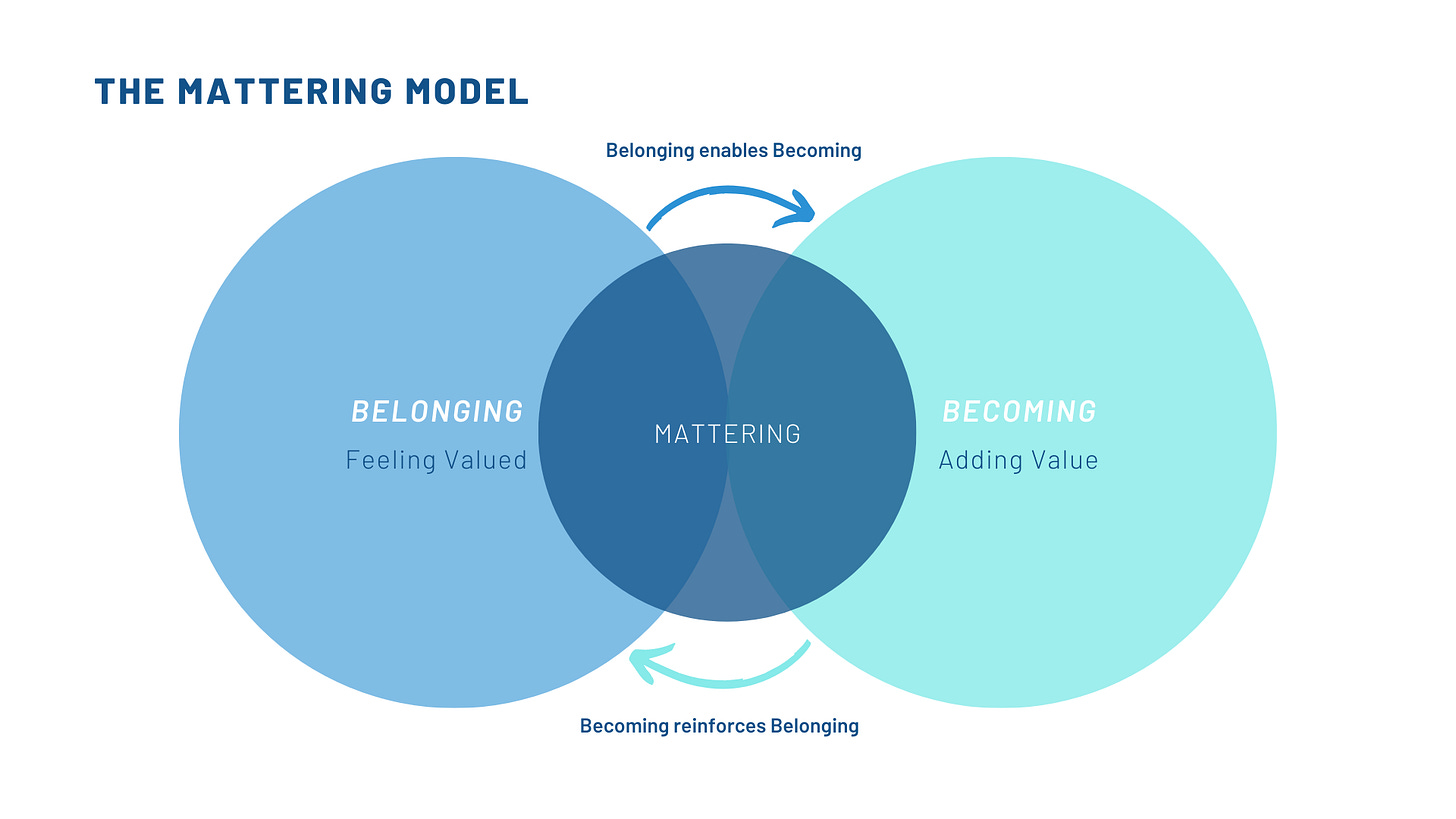The Mattering Model: What if Belonging Is Only 50% of the Answer?
Exploring how belonging and becoming shape cultures where everyone matters.
This follows the provocation on my previous blog: that while belonging is vital, it’s only part of the picture. If we want students, staff, and families to flourish, not just to feel included in our schools and across our trusts, we need to think beyond belonging. We need to create cultures of mattering, places where people feel valued and are given the opportunity to add value. In this blog I explore the relationship between three connected concepts: mattering, belonging and becoming.
Mattering, Belonging, and Becoming
The concept of mattering has emerged over the last four decades as a foundational psychological need, initially articulated by Rosenberg and McCullough (1981) and later developed by Schlossberg (1989) and more recently by Gordon Flett and others. Mattering is broadly defined as the perception that you are significant to others: your presence and contributions are recognised and valued. Contributors to the International Handbook of Human Significance and Mattering (2025), published earlier this year, describe the development of mattering as a "universal core need" and a defining "human quest".
In education, mattering has been associated with a wide range of positive outcomes. In Flett’s (2025) most recent book, Mattering as a Core Need in Children and Adolescents, studies are presented that link students’ sense of mattering with increased academic engagement, motivation, and resilience. However, a lack of mattering has been connected to poor attendance, disruptive behaviour, anxiety, depression, and, in extreme cases, self-harm and suicidal ideation. Flett’s concept of "anti-mattering" captures this experience of psychological invisibility and perceived insignificance, which can erode wellbeing and performance over time. Importantly, mattering is not a purely intrapersonal trait; it is shaped by relational, institutional, and cultural dynamics, particularly in schools.
Schlossberg’s work has emphasised the role of mattering in young people’s development of purpose, agency, and voice. In positive youth development literature, mattering is often described as a dual process: the experience of being valued by others, and the capacity to add value in return (Prilleltensky, 2020; Billingham and Irwin-Rogers, 2022; Flett, 2025). This duality is central to the model proposed here.
Belonging, often defined as the experience of social connectedness, acceptance, and inclusion, is a related but a distinct concept. A robust body of research shows that belonging is a protective factor for academic attainment, mental health, and school engagement (Korpershoek et al. 2020). Theories of belonging stress the importance of identity affirmation, psychological safety, and connection to institutional culture (Allen et al. 2018). However, belonging alone does not guarantee that individuals feel significant or empowered; it is possible to belong to a school community while still feeling voiceless, passive, or underutilised.
This leads to the third concept: becoming. Becoming has strong roots in theories of self-determination and flourishing (Ryan & Deci, 2000; Damon, 2008). Here, becoming is defined as the active process of adding value, participating, contributing, and growing within a community. It reflects not just who a person is, but who they are in the process of becoming through meaningful engagement. In other words, flourishing, through the engagement of one’s values, skills, and purpose (Ryff, 1989; Seligman, 2011).
Feeling Their Absence
The benefits of students feeling a strong sense of mattering, belonging and becoming are well-evidenced. The damage done by their absence is clear, too. These aren’t just abstract concepts, they show up in data, behaviour trends and engagement.
These states are not isolated. A student who feels belittled is more likely to stagnate. A student who feels thwarted may feel diminished by the experience. These self-concepts and emotional concepts can be damaging for staff and families, too. A teacher who feels insignificant may reduce their contribution or leave. A parent who doesn’t feel they belong may disengage. These experiences reinforce one another and chip away at trust, morale, and outcomes.
The Mattering Model: Belonging + Becoming = Mattering
In this model, mattering sits as the umbrella concept. It is achieved when people both feel valued (belonging) and are given opportunities to add value (becoming). These aren’t two separate activities, they are mutually reinforcing conditions of thriving in school.
Belonging enables becoming: When people feel accepted, safe, and seen, they are more likely to step forward, take risks, and contribute meaningfully. Feeling included opens the door to agency: if a student feels a valued member of the school community, this will encourage them to seek ways to support, develop and enhance that community.
Becoming reinforces belonging: When people are trusted to shape their community, whether through leadership, strong relationships, voice, or participation, they don’t just feel involved, they feel essential: not just a component part of the school, but an integral part of it.
This is the reinforcing loop at the heart of mattering. The more people feel they belong, the more they’re able to contribute. The more they contribute, the deeper their sense of connection and significance becomes.
50% of the Answer
To avoid any misunderstanding: belonging is essential. However, I believe belonging is 50% of the answer to 100% of the problem. But if the whole problem is disengagement, disconnection, and low trust, then belonging alone won’t fix it.
The other 50% is becoming. The question for schools and MATs is this: once people feel included — then what?
Because to belong is not enough. To matter is to feel valued and to add value. Organisations and institutions that build cultures of mattering don’t just retain people, they enable them to thrive.
References
Allen, K. A., Kern, M. L., Vella-Brodrick, D., Hattie, J., & Waters, L. (2018). What schools need to know about fostering school belonging: a meta-analysis. Educational Psychology Review, 30(1), 1–34.
Billingham, L., and Irwin-Rogers, K. (2022). 3: The Importance of Mattering in Young People’s Lives. In Against Youth Violence, Bristol, UK: Bristol University Press
Damon, W. (2008). The path to purpose: Helping our children find their calling in life. New York: Free Press.
Flett, G. L. (2025). Mattering as a Core Need in Children and Adolescents. Academic Press.
Korpershoek, H., Canrinus, E. T., Fokkens-Bruinsma, M., & de Boer, H. (2020). The relationships between school belonging and students’ academic achievement: A meta-analysis. Educational Research Review, 31, 100393.
Kruglanski, A.W., Prilleltensky, I., & Raviv, A. (Eds.). (2025). The Routledge International Handbook of Human Significance and Mattering (1st ed.). Routledge.
Prilleltensky, I. (2020). Mattering at the intersection of psychology, philosophy, and politics. American Journal of Community Psychology, 65(1–2), 16–34.
Rosenberg, M., & McCullough, B. C. (1981). Mattering: Inferred significance and mental health among adolescents. Research in Community & Mental Health, 2, 163–182.
Ryan, R. M., & Deci, E. L. (2000). Self-determination theory and the facilitation of intrinsic motivation, social development, and well-being. American Psychologist, 55(1), 68–78.
Ryff, C. D. (1989). Happiness is everything, or is it? Explorations on the meaning of psychological well-being. Journal of Personality and Social Psychology, 57(6), 1069–1081.
Schlossberg, N. K. (1989). Marginality and mattering: Key issues in building community. New Directions for Student Services, 1989(48), 5–15.
Seligman, M. E. P. (2011). Flourish: A visionary new understanding of happiness and well-being. New York: Free Press.






I really like this concept of more than belonging- actually mattering. It matters that you show up, you add value, you make a difference. Equally valuable for students and adults - thank you.
Love this blog Mohamed, however, I don't feel that it is possible to belong to a school community while still feeling voiceless, passive, or underutilised.... this is the very essence of belonging. To truly belong, you must be significant, you must feel that you contribute.....